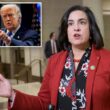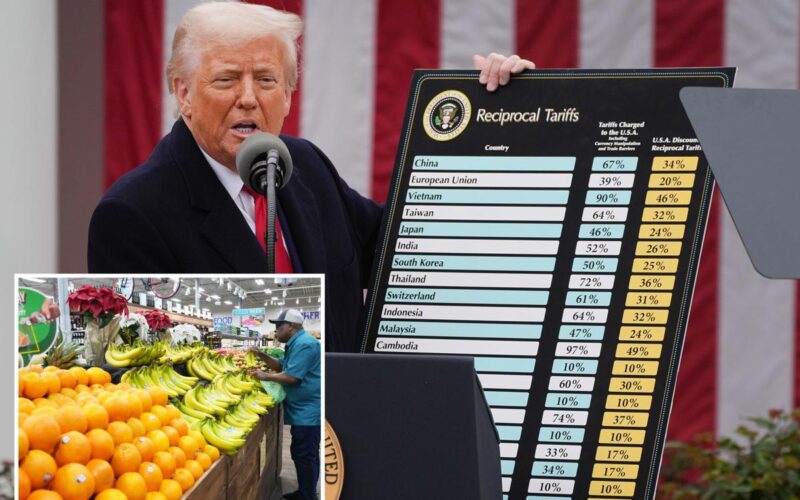Grocery prices will remain stiff across the board through Thanksgiving despite President Trump’s recent cancellation of tariffs on beef, bananas and more — and coffee drinkers shouldn’t expect relief until after Christmas, The Post has learned.
Supermarket chains in New York City and beyond said they had already ordered holiday goods before last week, when Trump said he was nixing levies on over 200 products from java and orange juice to steaks and spices.
According to industry sources, retailers aren’t planning to “eat the tariffs,” as the president had famously suggested to Walmart and others after he imposed the levies this spring.
“Our coffee prices will probably go down after Christmas,” said Stew Leonard, who runs eight eponymous grocery stores across New York, Connecticut and New Jersey. “We ordered enough product to get us through the holidays.”
That includes a shipping container full of Brazilian beans it was forced to buy at higher prices because of the tariffs, Leonard told The Post — and another is on the way.
Trump’s tariff retreat was meant to ease the pain after grocery prices climbed 2.7% in the 12 months ended Aug. 31, according to the Bureau of Labor Statistics. The price of coffee from the biggest producers – Brazil, Colombia, Ethiopia and Mexico – was up as much as 40% in September versus a year ago, government stats showed.
Meanwhile, a basket of 20 items at a Walmart store in Texas — including a dozen eggs, a 24-oz. box of Kellogg’s Corn Flakes, a 20-oz. bottle of Heinz Ketchup and 64-oz. bottle of Mott’s Apple Juice — cost $75.12 in October, according to an annual pricing study by Gordon Haskett Research Advisors. That’s 68.3% more than in 2019.
Americans are getting less than 20% of their total food and beverages from overseas, according to the US Department of Agriculture. But inflation pressures appear to be hitting their supermarket spending nevertheless, according to Leonard.
“We notice that people are eating home more,” he said. “And they are putting one less item in their carts.”
Stew Leonard’s imported coffee from Colombia and Brazil costs $12.99 a pound, up from $10.99 a year ago, according to the chain’s owner.
Last Thursday, Trump said he was removing tariffs on coffee, tropical fruits like bananas and other goods made in little quantity, if at all, in the US. The rollback was initially limited to products from Argentina, Ecuador, Guatemala and El Salvador. But a day later, the president widened the tariff exemptions, saying they applied regardless of where products came from.
Trump’s tariff rollbacks are part of the administration’s new focus on making everyday items more affordable since Democrats scored big wins in elections earlier this month. Voters increasingly say the rising cost of living is a top concern.
Some stores expect produce prices to come down after Thanksgiving.
Members of the National Supermarket Association, which represents 600 stores from New York to Florida, have about 10 days worth of perishable product in their pipelines at the higher tariffed prices, said Nelson Eusebio, the group’s head of government affairs. They expect to be able to lower produce prices after they sell their current inventories.
Customers at Stop & Shop’s more than 350 stores from Massachusetts to New York will start to see “some lower prices as we head into the holiday season because of the tariff rollbacks,” the company said in a statement.
Over the next week or so, tropical fruits and roots prices will “adjust lower,” and citrus fruits grown domestically will help to offset more expensive imported products because the citrus growing season in the US begins in November, the Quincy, Mass. grocery chain told The Post.
Prior to Trump’s tariff policy change, some businesses worked to keep prices down instead of passing the hikes on to customers.
Stop & Shop, which is owned by Dutch conglomerate Ahold Delhaize, said it “absorbed the impact of tariffs on some products, so our customers may not see fluctuations on all items listed in the executive order.”
Bananas at Stew Leonard’s have cost about 59 cents a pound, the owner said, because the company’s supplier absorbed the extra tariff costs imposed on countries from South and Central America.
Banana prices were up 8.6% as of September compared to a year ago, according to government data. But the vendor for Stew Leonard’s was concerned that it would lose the grocer’s business if it passed along the tariffs, Leonard said.
Tariffs on some countries seemingly made price hikes inevitable. Brazil – the world’s biggest coffee producer – was hit with over the summer with a 50% levy as Trump lashed out at the criminal case against the country’s former President Jair Bolsonaro.
Coffee prices were also affected by record drought conditions in Brazil and Vietnam over the past year, which lead to a lower yield of beans.








